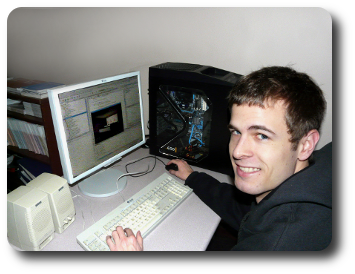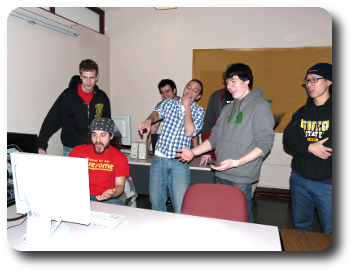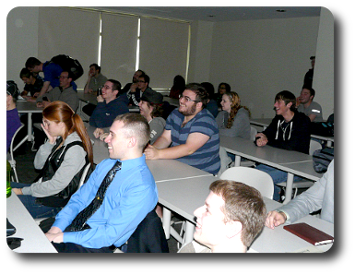Game Development Concentration in the Computer Science Major
The Game Development concentration was approved in 2011. In addition to all of the regular CS courses, it requires four out of the following five:
- CSC470 (Computer Graphics)
- CSC455 (Computer Game Development)
- CSC454 (Simulation and Virtual Worlds)
- CSC430 (Topics in Games)
- CSC420 (Graphical User Interfaces)
...and one of the four would better be 455.
You will notice that I teach all of them. Make sure that you are an excellent programmer and that you are very comfortable with vectors and matrices before you attempt the concentration. Differential equations do not hurt, either. Most of the courses move very quickly. 455 has a homework that is equivalent to a 3-level project just about every ten days.
NB: this is not a game design program / concentration. Here we build things that work. I do teach some game design in the Topics course, but the emphasis is on development. Also, do not come to me with your game ideas, looking for coding monkeys to implement them. We have plenty of ideas of our own. And we are not monkeys.
You can see some images from the Spring 2012 incarnation of 455. We do have a lot of fun in class, and we do build very cool stuff. Let me know if you are interested in the concentration.
Quest 2010
In 2010 I taught a pilot course that would become CSC455 Computer Game Development. Three weeks before the end of the semester we had a game competition at Quest, the annual SUNY Oswego fair. The students had to program AI-controlled spaceships for a multiplayer OpenGL framework I built for them that resembled the classic single-player Asteroids game (which they had implemented themselves earlier in the semester).
The students had complete freedom to choose the AI techniques that they thought would bring them victory. The seven participants chose various variations of FSMs, steering behaviors, and genetic algorithms. One student, John Familo, implemented an interesting planning algorithm that would attempt to move in front of the opponent's ship so that it could not shoot at asteroids. The winner, Aaron Marsh, later became the first graduate of the new concentration in December 2011.
Quest 2012
In 2012 we had the same competition, won by Joe Mirizio's ship. In addition, the students received the opportunity to show off their game projects to the excited audience. We had a lot of fun (as usual), and a great end to the semester. Some of the projects were so good that they managed to make up for their owners' disappearance for a month (hi Yongji). One project, a multiplayer shooter built by Eric McDuffee, is being converted to an undergraduate research project featuring procedurally generated content.







